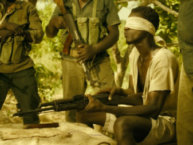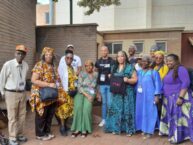 Mbogo Ireri is 38 years old and was born in Embu, Kenya. He lives in Nairobi with his wife and son (although currently he is away on a short job contract in Doha, Qatar). He wrote his first short story, “One False Move,” when he was 18 and it was published by BBC Focus on Africa Magazine in 1999. He is a hotelier by profession.
Mbogo Ireri is 38 years old and was born in Embu, Kenya. He lives in Nairobi with his wife and son (although currently he is away on a short job contract in Doha, Qatar). He wrote his first short story, “One False Move,” when he was 18 and it was published by BBC Focus on Africa Magazine in 1999. He is a hotelier by profession.
HOPES AND DREAMS
Just before the sun came up today, my father crept out of the house and hanged himself on the loquat tree in our front yard. I lay still pretending to be asleep as mother, worried about his long absence from the bed, shuffled in the house calling out in a low voice so as not to wake me up before it was time for school.
“Baba Ana! Baba Ana!”
The light from the torch she held swept under the door across my bedroom floor as she went outside in the dark still calling, “Baba Ana! Baba Ana!”
When she saw his body dangling from the tree, she stopped and screamed. A forceful scream that tore through the morning into the house, shook me out of my bed and flew out like a gust of cold air over the finger euphorbia fence into the village. It swept across the village to every house and went up and down racing with the milkmen as they rushed to the trading centre to sell off their milk. Everyone heard it, stopped and turned it in their heads the way you turn sour porridge in your mouth to know if good grain had been used.
My father’s body is lost in the thickness of the leaves. His bare feet peek through the hem of his white Kanzu, the one he slept in everyday. And his toenails are glowing. The toenails he had kept so meticulously clean and tucked away in his black shoes.
A persistent wind lashes mercilessly against me and Mama, and my blue overall jumper now feels like a wet rug glued to my body. Shivering with cold and fear, I hold on tightly to Mama’s Kanga. Her breath comes in short and shallow gasps and her body shakes violently.
Uncle Wokavi, my father’s only brother who lives across the fence, is the first one to arrive. He is wearing his white age-stained overcoat with the blue logo of Kithinjiro Slaughterhouse at the back. I reckon mother’s scream reached him when he was just getting ready to climb his bicycle for another day at the abattoir where he works turning tens of cattle into meat. Heavily built and stone-faced, it is said he could single-handedly wrestle bulls to the ground in the abattoir.
His taut eyes wander in quick successive movements, to me and to mama and to the tree. Then his huge shoulders fall at the sight of my father’s feet. He shudders helplessly, opens his mouth and covers it with his hand as if to stifle a scream. For a moment, his air of impregnable masculinity seems to vanish and he appears unsure of what is expected of him.
Then he lifts himself up in the tree, the branches sagging under his weight before he disappears in the leaves and fumbles with the rope around my father’s neck. It is a graceless effort that reminds me of one rainy Sunday morning when father climbed up to eject a tree hyrax that had wandered there at night and kept us awake with its loud cries. The leaves rustled and the branches snapped as he desperately attempted to hold his balance while prodding the adamant hyrax with a stick in a bid to scare it off. It had scurried down in a burst of shrieks that almost knocked him down.
My father’s body falls with a thud. It collapses at the base of the tree, legs sprawled forward so he looks like he is resting, the way sometimes people do after they have been working in the shamba on a hot day. His face is lost in the darkness, all its features blackened out. Mother’s short breaths develop into loud prolonged sobs that threaten to burst into another scream and I bury my face deeper in her Kanga.
Uncle Wokavi lifts the body effortlessly and carries it to the living room. He lays it on top of the green formica-top coffee table which mother has tearfully cleared of its usual things; a Gideon’s New Testament Bible, a tea kettle, cups, papers and a True Love magazine with its cover missing.
From the close neighbours to the distant ones where mother’s scream had trailed off and become lost among the cock crows and early birds calls, the villagers start streaking in as the sky glows with the faint orange of the daybreak. They all respond in various forms of disarray; hurriedly wrapped Kangas, creased coats, unkempt hair, unbrushed teeth, and faces resigned to the understanding that today’s usual routine has inevitably changed.
Questions are asked and answered in short contained lines. Eyes roll to the tree then hands brush past me to Mama. To embrace her, to wipe her tears. To tell her that it is all right. That she will be okay. But her face is vacant and responds with more tears.
An old woman I have never seen before regards me with empty eyes which fasten on my face, seeking a sorrow or a tear to direct her consolation. Seeing none, she pats my head and says, “Poor girl Anastacia! You had to lose your father and you are so young!”
The tree now stands boldly in the gradually rising sun exposing clusters of green and yellow loquats, twisted branches with dark green leaves stretching boundlessly across the grass below and a grey mouldy stem with gaping holes where old branches have died and rotted away.
It is an old tree. Mother had once told me that long before I was born, when they bought the land to build the house, she had found it, weak and choking under Lantana bushes and elephant grass. After the land was cleared and levelled, it had been left standing alone in what later became the front yard of our house.
It has held all the goodness and pain I have known over the years. It is at its base that mother drags me by the ear once a month and hacks through my hair with old fabric scissors. Long hair will harbour lice, she says. The scissors leave uneven lines on my scalp that make other girls giggle and taunt me at school.
And in the middle of the year, when the tree beckons me with fully ripe fruit, she lets me climb the tree to eat the loquats. Being her only child, she understands how much I relish loquats and relents with an offhand warning that if I keep climbing the tree I will not grow up to be a real woman and if I swallow a seed, I will go blind and birds will play and make nests on my head.
Sometimes I call Njoki, my best friend to come play with me. I always let her pick the juiciest loquats and even let her carry some to her brother. In exchange, she lets me copy her homework. She is the brightest in our class and she wants to be a doctor when she grows up. In my tree though, she transforms to a pretty model who can hold her face straight up and flick away at a non-existent pony tail. She even learned how to sound like Catherine Kasavuli, the beautiful lady who reads the news on TV every night: Good evening viewers and welcome to KBC news at nine. Today the president...
Now the villagers queue to the living room where my father’s body lies shrouded in a green sheet with his face turned upwards to the ceiling. They stand over him in a neat line like ants paying last respects to their fallen king. They love him. He is a big name. The only one in our village who worked in Nairobi, that big mysterious city few of them had visited.
For twenty years he had sifted through papers in the Lands Commission in a small office that smelled of old files and dampness. Once a month, when he travelled home from the city, people came from all over the village to see him. Sometimes they brought with them the hopes and dreams that only a man who knows the city well would understand; title deed transfers of dead wealthy relatives, children’s college applications, birth certificates and so forth.
He would sit with them under the loquat tree and discuss things I never understood in hushed tones.
These things are hard
I know someone in that department
Two thousand shillings, maybe more depending…
Only after they shook his hand with folded notes would mother serve them tea and arrowroots. Then the discussion would drift off to other things, like how the harvest was that season or whose daughter was seen with whose son or how low the payout for coffee beans was that year. Then father would fill his small black briefcase with their hopes and dreams and head off back to the city.
It had been like this until four months ago.
The new government had promised to ‘uproot the tree of corruption’. The latest Anti-Corruption Survey showed that the Lands Commission was number three in the corruption index after the Police Department and the Civil Registration Bureau. A report was hurriedly compiled that recommended long-serving workers to be forcefully retired and younger employees hired to run the departments.
Although at forty years, my father was spared the “axing” as it was called, an overzealous agent from the Anti-Corruption Department had found, in his files, evidence of misappropriation and corrupt deals that had lost the government huge sums of money. I imagined he had, like Derrick the old German detective on TV, taken a small torch out of his trench coat pocket and shone a light on the files and found a few numbers either missing or in the wrong place.
He had been sacked immediately with orders to report to the District Commissioner’s office once every week until the investigations were over. The city had spat him out the way you spit out sour loquats.
I remember the night he came home from Nairobi for the last time, shoulders slack, worn out and rambling about the damn government and the civil service that was to be ran by inexperienced university graduates. He had placed his briefcase on the table and ran his fingers painfully on its surface like a master guitarist silently blaming his guitar after a poor performance.
Perhaps it was the briefcase, that insidious part of him – the one he filled with people’s hopes and dreams that caught the attention of the anti-corruption officer. Its old leather covering was old and torn and parts of its rusty steel framework stuck out at the edges. Plus, it was strained with too much wear and an overload of papers that carried all sorts of problems.
That evening I watched him, as he ate dinner – the way he molded lumps of ugali into perfect balls, scooped sukuma wiki with his fingers and brought them to his mouth in slow and flawless movements. There was always a calculated correctness in him that I admired. Between mouthfuls he ranted about the unpaid bank loan, my KCPE registration payment that was long overdue and how he was being used as a sacrificial lamb by his bosses. Mother just listened and nodded intently.
“He who earns calamity must eat it with his family,” she said as she served him more Sukuma Wiki.
On the second month after his dismissal, the newspapers published names of civil servants that would be prosecuted for corruption. His name was there on the front page under a big title: THE LIST OF SHAME. He was being accused of fraudulently transferring land titles for hundreds of acres meant for internally displaced people. He was promptly summoned to court and charges filed against him.
On TV they showed families of internally displaced people huddled together in a flat barren land with no trees, only tents and more tents. As the adults told their sad sad stories, children with runny noses peered shyly at the camera. They looked lost as if a dark cloud had permanently hung above their heads. Was my father responsible for their unhappiness?
Now Uncle Wokavi approaches the tree with an axe resting over his shoulder. He moves his eyes up and down as if daring it for a fight. People step away from the tree as the axe makes contact. Chop! Chop! It shakes with every swing. Splinters fly in all directions. I wonder if the tree can feel pain. Fear. Hate. Guilt.
Sweat drips down Uncle Wokavi’s face and neck and his huge muscles look like they will burst out of his arms. A few over ripe loquats fall on his back but he does not seem to notice. He swings the axe like one purging a curse, petrified silence all around him.
After some time, he gives the axe to a scrawny tired-looking younger man who accepts the honour with beaming eyes but swings the axe with little vigour. The stem meets every blow defiantly and the axe makes dull tired sounds like our school bell, an old tyre rim suspended from a tree with a rope that tolls painfully everyday at 12:45PM to call us for lunch.
The women are busy serving steaming tea in tin cups. Someone pushes a cup in my hands. I hold it close to my face so it can warm my face and the hot steam forms beads of water that quickly run cold down my face.
From the corner of my eye, I can see Njoki. Her hair is braided neatly and the ends fastened with rubber bands. Green. Red. Yellow. Her eyes, averted from mine, are lost in the upper branches where we had spent empty hours practising our nasal-accented English to tease boys in school and contorted our faces to the acrid taste of the loquats. Maybe she is trying to capture the spirit of the tree before it disappears. Or maybe she is just listening to the tired sounds of the axe and thinking about lunch.
My father’s case became highly publicised by TV and newspaper crews that followed him to court every time and battered him with endless questions. He pleaded his innocence on the cameras and to the faces of stone-faced journalists but always reserved his calm and carefully selected words for the courtroom.
As the case dragged for weeks, it opened old wounds that had healed and been forgotten altogether; a foreign tribe that had settled in the country generations ago now launched fresh pleas for recognition and land rights. A primary school in the city filed a suit claiming its land had been grabbed two years ago. Tensions flared over a common grazing field that had been used peacefully by three pastoralist communities for years. In the middle of it was my father, a national symbol of disgrace whose face was repeatedly splashed on newspapers.
One day on his way to court, a woman threw a fistful of soil at his face shouting that he was evil and that he deserved to be jailed.
He took it silently and calmly with the same stoic face he had as he stood before the judges and pleaded his innocence in packed courtrooms.
But everyday he seemed to lose the part of him that was smart and correct. The pinstripped suits he had worn proudly in Nairobi now hang loose on his shoulders. His briefcase, which he now carried everyday to court, seemed to outweigh him with its endless load of lawyers’ invoices and stacks of papers that pleaded his innocence.
With time dry furrows formed on the sides of his nose and ran down to his beard that had started to look hard and twisted like an old tired shoe brush. The smell of his breath became putrid, and he became slouchy and absent-minded, sometimes not noticing when small bits of ugali got trapped in the corners of his mouth or when the green sauce from the sukuma wiki dripped between his fingers, soiling his shirt. His eyes became distant and sunk deeper in the sockets and it was as if he stopped opening them wide enough to notice me and mother.
So I ran to the loquat tree more – to sit on the upper branches where I could see the silhouettes of Kiang’ombe hills rising out of Kirimiri forest where djinns are said to beat drums and dance around bonfires at night. There I had sought to bring back my old father. In the silence of the evenings, decorated only by sounds of crickets, I conjured up his smiling face over the hills in the lush greenery where River Kapingazi swallows smaller rivers and became Rupingazi. There, I had him take me to Nairobi and buy me goodie goodie gumdrops and carry me on his strong shoulders the way he had carried me on my first day to school. I saw him laugh and cheer as I danced around the house with the purple Bata Bullet shoes he had bought for me. I brought back the evenings I had snuggled on his lap when he came home with strange city smells. Then I musked his unsavoury breath with the fragrance of the warindi so that when he spoke a sweet smell escaped his mouth and filled the whole house.
When it became too dark to see and my dreams broke into a thousand pieces and scattered over the hills, I would climb down silently to help Mama in the kitchen.
While she cooked dinner, father would sit hunched over his papers making notes with a fountain pen, sometimes talking to himself. Looking at him brought to my mind the beans Mrs. Kathuri made us grow at the corner of our classroom. They had sprouted from the soil strong and sturdy but had grown sideways in perpetual pursuit of the sunlight from the window. Photosynthesis – she had called it. They had barely made it to touch that flicker of hope when they withered and died. My father hoping for the light had reached out to people but only problems had come flooding in.
Yesterday evening I watched, through a gap on my bedroom wall, as he set his briefcase on fire together with the papers that could no longer save him – an act of defiance against the court that was finding his integrity increasingly lacking and was slowly closing on him. He stood over the flames muttering to himself, his sweaty face gleaming against the light of the flames as burnt out pieces of paper rose from the fire and danced around him. When the fire had died, he stomped on the whole mess, as if something undesirable had survived and needed to be quashed.
Chop! Chop!
The notch on the side of the tree has now grown deeper. The young man, anticipating results, now chops with heightened energy, but with every swing his faces twists painfully and his bones look like they will break and jut out through his skin.
“Anastacia, go put on a sweater or you will catch a cold!” One of my aunts yells.
I turn and as I start to walk to the house the tree comes crashing down. Branches break and loquats bounce and roll on the ground like marbles. It is a short and hard fall.
The crowd thaws.
Hot tears run unheeded down my face for the first time today.





